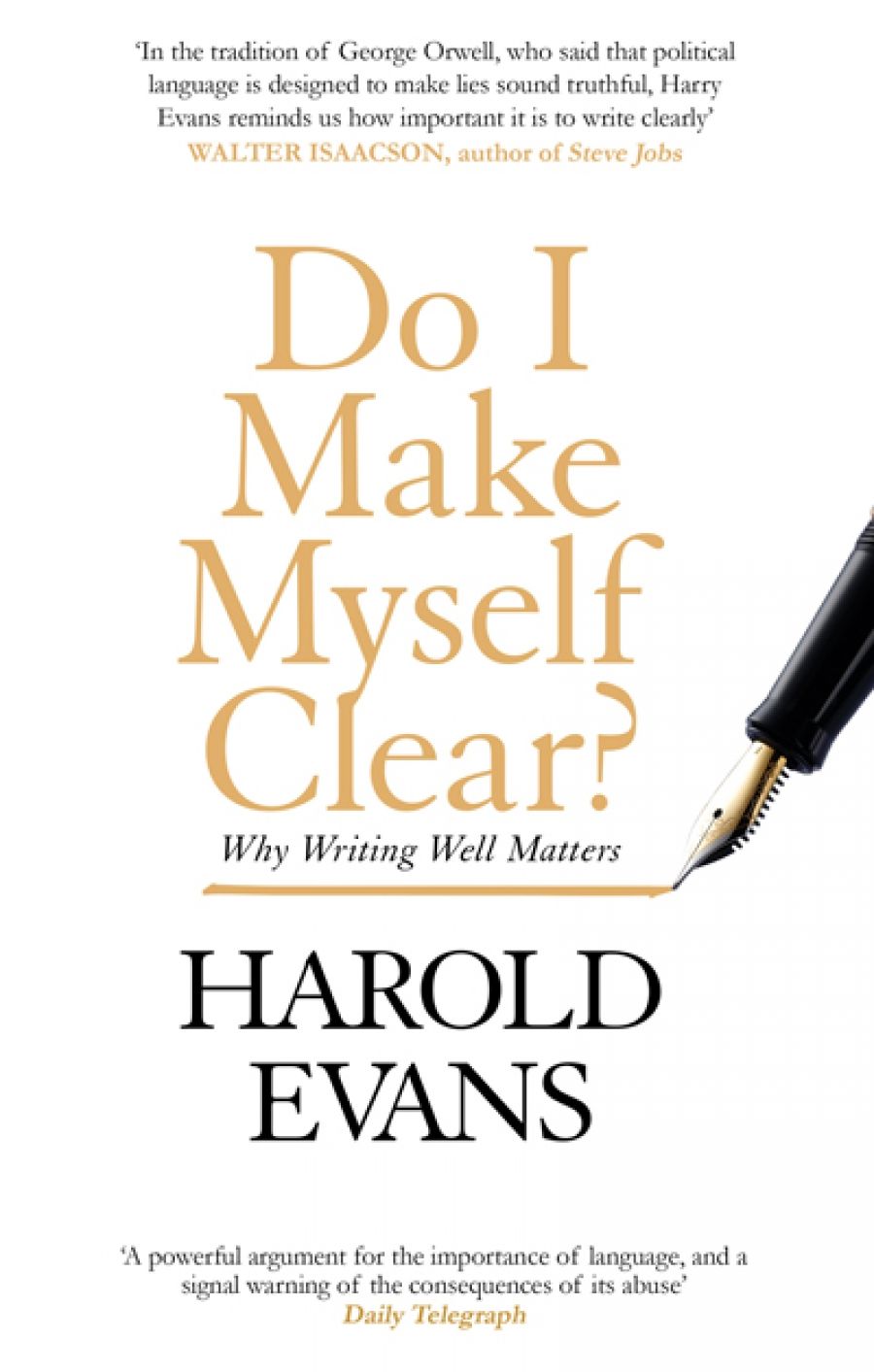
- Free Article: No
- Contents Category: Literary Studies
- Custom Article Title: Richard Walsh reviews 'Do I Make Myself Clear?: Why writing well matters' by Harold Evans
- Custom Highlight Text:
Harold Evans, the celebrated former editor of London’s The Sunday Times and ex-president of Random House USA, is angry. He fulminates against lazy journalism, against the impenetrability of government announcements, and against the pseudo-legal language of terms and conditions we ...
- Book 1 Title: Do I Make Myself Clear?
- Book 1 Subtitle: Why writing well matters
- Book 1 Biblio: Abacus, $55 hb, 408 pp, 9781408709665
There is, of course, a vast literature of complaint against the ever-changing shifts in both everyday and literary expression, and Evans’s bibliography provides an excellent guide to what has gone before him. As a paid-up member of the Anglo-American intelligentsia, he hugely admires both George Orwell’s celebrated polemic ‘Politics and the English Language’ (1946) and the contributions of E. B. White (Evans appears not to be aware of the writings of Don Watson). The real question is: what on earth can he bring to this vast banquet that is already laid before us?
At times, Evans can be immensely amusing and instructive. He provides egregious examples of bad writing from a wide range of sources; his scoffing, while predictable, nonetheless invigorates our love of clear language and fine writing, of which he also provides many excellent examples. But in between all that, his book becomes a kind of high-class user’s manual.
He provides extensive lists of pleonasms, clichés, and zombies (his description of nouns such as implementation and transmittal); he implores us to eschew all such monstrosities. Most problematically of all, he offers us ‘Ten Shortcuts to Making Yourself Clear’; here we seem to have momentarily signed up for a DIY-writing improvement course. Even worse, because it threatens his credibility, he seems to take seriously the idea of ‘readability formulas’: the seductive idea that it is possible to devise easy-to-follow recipes for good writing. This is the kind of alchemy you would imagine appealing more to the whiz-kids at Microsoft (who will not allow me type cafe or cliche in a Word document without gifting me an unnecessary and very pretentious acute on the final e) than to someone with Evans’s CV.
Evans writes admiringly of the work of Lucius Adelno Sherman, who painstakingly counted ‘the number of words, prepositions, clauses, predications, abstract nouns, and so on’ in a wide range of works by celebrated American and English prose stylists, and published his findings (with tables and graphs) in his book Analytics of Literature (1893). Evans writes: ‘He found solace in discovering that from an early-sixteenth-century average of fifty words a sentence, the average fell to forty-five in the Elizabethan era, twenty-nine in the Victorian era, and twenty-three in the early twentieth century.’ Evans fails to tell us whether anyone was amazed to be informed of this, but he goes on to introduce us to the Flesch Reading Ease Index and the Dale–Chall Formula, the latter touted as ‘the most reliable of all the readability formulas’.
 Harold Evans (Wikimedia Commons)
Harold Evans (Wikimedia Commons)
Nothing ages a man more than succumbing to pedantry or to railing vehemently against the inevitable changes that occur in our vocabulary and its usage over time. I always think it is best to imagine the English language as a coastline battling against the waves – imperceptibly, and for good or ill, it changes its shape every hour of our lives. Evans is totally aware that he is not the first, and presumably not the last, to inveigh against modern tendencies. He reminds us that Jonathan Swift condemned as vulgar slang such newcomers as mob, bamboozle, sham, bully, banter, and uppish. Dr Johnson declined to include clever, stingy, and reliable in his trailblazing (not the prescribing doctor’s word) dictionary.
Evans endorses the hostility of New Zealand academic Helen Sword to ‘zombie nouns’, so labelled by her ‘because they cannibalize active verbs, suck the lifeblood from adjectives and substitute abstract entities for human beings’. While a posse of zombies is fearsome to behold, and to be discouraged, words like documentation, participation, and forgetfulness, which Evans singles out for censure, offer linguistic nuances that their synonyms lack. As always, he provides a long blacklist of modern carelessnesses; I share some of his horror (it never fails to scare me on the New York subway when there is a barely intelligible public announcement that the next train will stop ‘momentarily’), and I was surprised to find the modern home/hone confusion did not rate a mention (maybe it is more rampant in Australia?).
In the end, it is unclear to me who exactly is Evans’s intended reader. He seems to admit that novelists have a licence to ignore all the rules, but he does not appear to recognise that the best non-fiction today is also being written with compelling inventiveness (one of the lasting legacies of the late great Tom Wolfe). No such writers could afford to be weighed down by Evans’s well-intentioned advice in their saddlebag. It would be fatal for them to write so self-consciously.
Evans’s ‘Sentence Clinic’, ‘Ten Shortcuts’, and lists of dos and don’ts would be a useful antidote against the prolixity and incomprehensibility of most press releases, website communications, and government pronouncements, unless, as I fear, they are actually intended to be opaque. In a world in which far too much subediting for print media is being performed by underpaid puddles of PhD students, unable to find any other useful outlet for their intellects, I fear that this noble linguistic evangelist may well be urinating in a windward direction.


Comments powered by CComment